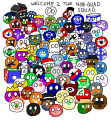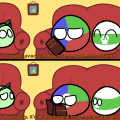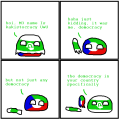 |
This page is about an important IRL ideology "This knowledge is essential to political science!" - Scientocracy This page is about an ideology that not only exists in the real world, but is also of reasonable importance. Please do not make major edits to this page without citing sources, so that it may stay accurate. |
This page is about the ideology that advocates for a political system based on voting. For the ideology of the US Democratic Party see
Big Tent Liberalism,
Third Way or
Social Liberalism.
Democracy (Dem) is a non-quadrant ball used to represent democracy without any more adjectives. Dem believes that the people residing within a state all have the right to decide rules, policies, leaders, etc. based off what most people want. Dem is also not to be confused with ![]() Republicanism.
Republicanism.
Variants
 Representative Democracy
Representative Democracy
Representative democracy also called ![]() Republican democracy or indirect democracy is a form of government in which the people elect representatives who administer, establish and execute all the interests of the population. This is by far the most common variant, with almost all established democracies currently using it.
Republican democracy or indirect democracy is a form of government in which the people elect representatives who administer, establish and execute all the interests of the population. This is by far the most common variant, with almost all established democracies currently using it.
 Semi-Direct Democracy
Semi-Direct Democracy 
Semi-direct democracy is a variant of democracy that combines direct and representative democracy. In this system, the rulers are elected by the people, but the citizens maintain sovereignty through, for example: referendum, public consultation, popular initiative and revocation of the mandate. It is currently practiced in Switzerland, Liechtenstein and at the local level in most of the United States.
 Direct Democracy
Direct Democracy
Direct democracy is a variant where the population is given full control over policy making rather then having to elect legislators like in a Representative Democracy. Historically practiced in Ancient Greece in the city of ![]() Athens,
Athens, ![]() Revolutionary France and the
Revolutionary France and the ![]() Paris Commune, it is nowadays practiced in the autonomous region of
Paris Commune, it is nowadays practiced in the autonomous region of ![]() Rojava and in
Rojava and in ![]() Chiapas.
Chiapas.
 Defensive Democracy
Defensive Democracy
Defensive democracy is a term referring to the collection of laws, delegated legislation, and court rulings which limit certain rights and freedoms in a democratic society in order to protect the existence of the state, its democratic character, institutions and human rights. The term describes a major conflict that may emerge in a democratic country between compliance with democratic values, particularly freedom of association and the right to be elected, and between preventing anti-democratic parties, groups and persons from abusing these principles.
In certain democratic states there are additional special distinctions, supported by a notable section of the population, which justify the use of defensive democracy. However, the question of in what situations the use of defensive democracy is justified without this being considered excessive repression of civil rights is disputed. To some extent this can be argued to be a form of ![]() Authoritarian Democracy.
Authoritarian Democracy.
Economic Democracy
Economic democracy (sometimes called a Democratic Economy) is a socioeconomic philosophy that proposes to shift ownership and decision-making power from corporate shareholders and corporate managers (such as a board of directors) to a larger group of public stakeholders that includes workers, consumers, suppliers, communities and the broader public.
 Non-Partisan Democracy
Non-Partisan Democracy
Nonpartisan democracy, also known as a No-Party Democracy, is a system of representative government or organization such that universal and periodic elections take place without reference to political parties. Sometimes electioneering and even speaking about candidates may be discouraged, so as not to prejudice others' decisions or create a contentious atmosphere.
 Demobureaucracy
Demobureaucracy
Demobureaucracy is a term referring to the hypothetical system where the right to be elected by the general public extends at least throughout the seniormost offices in public administration. The term may describe various processes whereby the administrative offices are generally elected from a pool of self or chief-executive-selected, but particularly chief-executive-selected candidates. To some extent, this can be argued to be what Woodrow Wilson was trying to talk about in this passage of an article he wrote:
But to fear the creation of a domineering, illiberal officialism as a result of the studies I am here proposing is to miss altogether the principle upon which I wish most to insist. That principle is, that administration in the United States must be at all points sensitive to public opinion. A body of thoroughly trained officials serving during good behavior we must have in any case: that is a plain business necessity. But the apprehension that such a body will be anything un-American clears away the moment it is asked. What is to constitute good behavior? For that question obviously carries its own answer on its face. Steady, hearty allegiance to the policy of the government they serve will constitute good behavior. That policy will have no taint of officialism about it. It will not be the creation of permanent officials, but of statesmen whose responsibility to public opinion will be direct and inevitable. Bureaucracy can exist only where the whole service of the state is removed from the common political life of the people, its chiefs as well as its rank and file. Its motives, its objects, its policy, its standards, must be bureaucratic. It would be difficult to point out any examples of impudent exclusiveness and arbitrariness on the part of officials doing service under a chief of department who really served the people, as all our chiefs of departments must be made to do. It would be easy, on the other hand, to adduce other instances like that of the influence of Stein in Prussia, where the leadership of one statesman imbued with true public spirit transformed arrogant and perfunctory bureaux into public-spirited instruments of just government.
 Democratic Globalization
Democratic Globalization
Democratic Globalization is social movement which is aimed for the creation of a institutional system of global democracy. This social movement stems from the international theory of ![]() cosmopolitanism. The stated purpose of democratic globalization by proponents is to make people around the world more united. This form of globalization differs from economic globalization, as some proponents of the anti-globalist movement do not necessarily disagree with these positions.
cosmopolitanism. The stated purpose of democratic globalization by proponents is to make people around the world more united. This form of globalization differs from economic globalization, as some proponents of the anti-globalist movement do not necessarily disagree with these positions.
 Deliberative Democracy
Deliberative Democracy
Deliberative democracy is a form of democracy in which deliberation is considered central to good legislation. It adopts elements of both consensus decision-making and majority rule. Deliberative democracy differs from traditional democratic theory in that authentic deliberation, not mere voting, is the primary source of legitimacy for the law. Deliberative democracy is closely related to consultative democracy, in which public consultation with citizens is central to democratic processes.
 Democratic Centralism
Democratic Centralism
Democratic Centralism is a practice in which political decisions reached by voting processes are binding upon all members of the political party. It is mainly associated with ![]() Leninism, wherein the party's political vanguard of professional revolutionaries practized democratic centralism to elect leaders and officers, determine policy through free discussion, and decisively realize it through united action. Democratic centralism has also been practiced by social democratic and democratic socialist parties as well.
Leninism, wherein the party's political vanguard of professional revolutionaries practized democratic centralism to elect leaders and officers, determine policy through free discussion, and decisively realize it through united action. Democratic centralism has also been practiced by social democratic and democratic socialist parties as well.
 Democratic Transhumanism
Democratic Transhumanism 
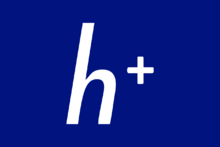
Democratic Transhumanism, shortened to Demh+, is a ![]() democratic, often
democratic, often ![]() culturally progressive, pro-technology ideology.
culturally progressive, pro-technology ideology.
Democratic Transhumanism believes that the concept of ![]() Transhumanism would fit within a
Transhumanism would fit within a ![]() liberal,
liberal, ![]() social and/or radical democratic society, supporting equal access to human enhancement technologies in order to promote social equality and to prevent further divide between the socioeconomic classes.
social and/or radical democratic society, supporting equal access to human enhancement technologies in order to promote social equality and to prevent further divide between the socioeconomic classes.
James Hughes has referred to "![]() techno-progressivism" as another name for Democratic Transhumanism, but it can also refer to the support of both technological and social reform in general.
techno-progressivism" as another name for Democratic Transhumanism, but it can also refer to the support of both technological and social reform in general.
Personality
In all contexts in which there's a debate, Dem will always suggest it to settle out with a vote. Sometimes in a comedic context, Dem might support a radical decision simply because there was a vote on it.
How to Draw
Representative Democracy
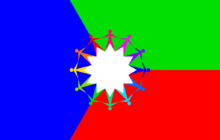
The design of Democracy utilizes this flag uploaded to Wikimedia Commons in 2011.
- Draw a ball with eyes.
- Separate the Ball into 3 roughly equal sized sections;
- Blue, on the left, in a triangle-like shape,
- Red, the bottom right,
- Green, top right.
- In the middle draw a white circle.
- Around the middle Circle draw smaller circles with the colours mentioned before (Red, Green and Blue) and the 3 combinations of those colours (Yellow, Purple and Cyan) in a positions physically opposite of each other.
You're done!
| Color Name | HEX | RGB | |
|---|---|---|---|
| Green | #21B14C | 33, 177, 76 | |
| Blue | #3F47CB | 63, 71, 203 | |
| Red | #EC1D24 | 236, 29, 36 | |
| Magenta | #FF00FF | 255, 0, 255 | |
| Purple | #7F00FF | 127, 0, 255 | |
| Light Blue | #006EFF | 0, 110, 255 | |
| Cyan | #00DDFF | 0, 221, 255 | |
| Yellow-Green | #7FDD00 | 127, 221, 0 | |
| Yellow | #FFDD00 | 255, 221, 0 | |
| Orange | #FF6E00 | 255, 110, 0 | |
Semi-Direct Democracy
- Draw a ball.
- Draw a top-to-bottom tricolor of green, blue and red.
- Add three white lines across the blue stripe. Make sure they don't reach the edges of the ball.
- Add eyes.
You're done!
Direct Democracy
- Draw a ball
- Fill it with the colour white
- Add three coloured lines across the middle;
- Green as the top line,
- Blue as the middle,
- Red as the bottom.
- Add eyes.
You're done!
Defensive Democracy
- Draw a ball with eyes.
- Separate the ball into 3 roughly equal sized sections;
- White, on the left, in a triangle-like shape,
- Light Cyan, at the bottom right,
- Black, top right.
- In the middle draw a circle with Dark Cyan.
- Around the circle draw 12 smaller circles, all with a colour from the previous section, in a clock-wise manner; i.e 4 Black circles in the Light Cyan section, 4 Light Cyan ones in the White section, etc.
- Draw a nurse cap, colour it with Soft Cyan.
- Add a Dark Cyan cross to the hat.
You're done!
| Color Name | HEX | RGB | |
|---|---|---|---|
| Light Cyan | #71CACC | 113, 202, 204 | |
| Black | #141414 | 20, 20, 20 | |
| White | #FFFFFF | 255, 255, 255 | |
| Soft Cyan | #8BDFDC | 139, 223, 220 | |
| Dark Cyan | #308FA6 | 48, 143, 166 | |
Demobureaucracy
- Draw a ball with eyes.
- Separate the ball into 3 roughly equal sized sections;
- White, on the left, in a triangle-like shape,
- Half Light and half Dark Cyan, at the bottom right,
- Black, top right.
- In the middle draw a circle with Dark Cyan.
- Around the circle draw 12 smaller circles, all with a colour from the previous section, in a clock-wise manner; i.e 4 Black circles in the Half-Light-Half-Dark Cyan section, 2 Light Cyan and 2 Dark Cyan ones in the White section, etc.
- Draw the glasses.
You're done!
| Color Name | HEX | RGB | |
|---|---|---|---|
| Light Cyan | #71CACC | 113, 202, 204 | |
| Black | #141414 | 20, 20, 20 | |
| White | #FFFFFF | 255, 255, 255 | |
| Dark Cyan | #308FA6 | 48, 143, 166 | |
Relationships
Friends
 Athenian Democracy - My based Papa.
Athenian Democracy - My based Papa. Radical Democracy - My radical son.
Radical Democracy - My radical son. E-Democracy - My internet loving son.
E-Democracy - My internet loving son. Liquid Democracy - My more extreme son.
Liquid Democracy - My more extreme son. Diasimocracy - My popular friend.
Diasimocracy - My popular friend. Anti-Authoritarianism - A huge fan of mine.
Anti-Authoritarianism - A huge fan of mine. National Democracy - Polish Nationalism but based.
National Democracy - Polish Nationalism but based. Christian Democracy &
Christian Democracy &  Islamic Democracy - Theocracies but based.
Islamic Democracy - Theocracies but based. Democratic Socialism - Socialism but based.
Democratic Socialism - Socialism but based. Social Democracy - He likes welfare and democracy.
Social Democracy - He likes welfare and democracy. Liberalism - Progressivism but based.
Liberalism - Progressivism but based. Technoliberalism - Looks like technocracy finally stopped being elitist.
Technoliberalism - Looks like technocracy finally stopped being elitist. Elective Monarchism and
Elective Monarchism and  Constitutional Monarchism - The good forms of monarchism.
Constitutional Monarchism - The good forms of monarchism. MacArthurism - Even though you did have a massive ego, you did called out Sutherland for suggesting a military junta during war time[1] and made Japan a modern democratic state.[2]
MacArthurism - Even though you did have a massive ego, you did called out Sutherland for suggesting a military junta during war time[1] and made Japan a modern democratic state.[2]- Every explicitly democratic ideology.
Frenemies
 Neoconservatism - This dude really likes me and wants to spread me worldwide! I just... don't know how to feel about some of your supporters backing foreign dictatorships and causing wars.
Neoconservatism - This dude really likes me and wants to spread me worldwide! I just... don't know how to feel about some of your supporters backing foreign dictatorships and causing wars. Authoritarian Democracy - My statist child.
Authoritarian Democracy - My statist child. Ochlocracy - Aren't you just a direct version of authdem?
Ochlocracy - Aren't you just a direct version of authdem? Demarchy - While you do represent the will of the people, are you sure what you're doing is good?
Demarchy - While you do represent the will of the people, are you sure what you're doing is good? Mediocracy - Thanks, I hate the fact he is technically right and that I always feel self-hatred when I see him...
Mediocracy - Thanks, I hate the fact he is technically right and that I always feel self-hatred when I see him... Anarchism - Her entire family is against my "representative" variant, but most of her children are favorable towards my "direct" variant.
Anarchism - Her entire family is against my "representative" variant, but most of her children are favorable towards my "direct" variant. Tridemism
Tridemism  - My Georgist and nationalist counterpart... who apparently doesn't mind simping for authoritarian.
- My Georgist and nationalist counterpart... who apparently doesn't mind simping for authoritarian. Kemalism - Similar to the above, but Turkish.
Kemalism - Similar to the above, but Turkish. Jacobinism - Similar to the two above, but French.
Jacobinism - Similar to the two above, but French. Democratism - Please get rid of the electoral college and watch out for
Democratism - Please get rid of the electoral college and watch out for  his influence, and then you will fully live up to your name. But at least you try.
his influence, and then you will fully live up to your name. But at least you try. Particracy - It's not like I hate the concept of political parties, but in many places, you wound up causing a lot of harm to the democratic process. Also, your authoritarian variants are obviously pretty cringe.
Particracy - It's not like I hate the concept of political parties, but in many places, you wound up causing a lot of harm to the democratic process. Also, your authoritarian variants are obviously pretty cringe. Socialism - You claimed that you are me but applied to economics, and I understand that. But why are a lot of your children are authoritarian or even totalitarian? (
Socialism - You claimed that you are me but applied to economics, and I understand that. But why are a lot of your children are authoritarian or even totalitarian? ( Demsoc and
Demsoc and  Socdem are based though.)
Socdem are based though.) Authoritarianism - The people should have their say! Though sometimes the people want an authoritarian leader.
Authoritarianism - The people should have their say! Though sometimes the people want an authoritarian leader. Populism - I don’t really dislike you as you can help me sometimes, but some authoritarians often use you to achieve their goals.
Populism - I don’t really dislike you as you can help me sometimes, but some authoritarians often use you to achieve their goals.- Every other ideology is not explicitly against him.
Enemies
 Totalitarianism - YOU ARE EVIL!
Totalitarianism - YOU ARE EVIL! Autocracy - The people should make decisions, not you!
Autocracy - The people should make decisions, not you! Fascism - Can't handle just one vote?
Fascism - Can't handle just one vote? Marxism-Leninism - No, your little "vanguard" oligarchy is not a democracy lol.
Marxism-Leninism - No, your little "vanguard" oligarchy is not a democracy lol. Absolute Monarchism - Your system is outdated nowdays. You won't be missed anyway.
Absolute Monarchism - Your system is outdated nowdays. You won't be missed anyway. Hoppeanism - He wants to physically remove me.
Hoppeanism - He wants to physically remove me. Anarcho-Egoism - No.
Anarcho-Egoism - No. Post-Leftism - NO!
Post-Leftism - NO! Anarcho-Fascism - Just... Why???
Anarcho-Fascism - Just... Why??? Primalism - Animals don't deserve voting rights due to lack of reasoning.
Primalism - Animals don't deserve voting rights due to lack of reasoning. Technocracy - Thinks he's soooo smart and not just fancy
Technocracy - Thinks he's soooo smart and not just fancy  Oligarchy.
Oligarchy.

 Fools and more - Those guys used me to destroy me. But they failed and killed themselves, got killed or exiled, respectively.
Fools and more - Those guys used me to destroy me. But they failed and killed themselves, got killed or exiled, respectively. Ilminism - May 18th 1980 NEVER FORGET!
Ilminism - May 18th 1980 NEVER FORGET! Juche - Stop saying you’re democratic as you never listen to the people!
Juche - Stop saying you’re democratic as you never listen to the people! Jihadism - Are you freaking kidding me!? Stop terrorizing people and trying to destroy me, you terrorist!
Jihadism - Are you freaking kidding me!? Stop terrorizing people and trying to destroy me, you terrorist! State Liberalism - And what if people don't follow your ideas and prefer to vote for someone else?
State Liberalism - And what if people don't follow your ideas and prefer to vote for someone else? Stratocracy - Bad dog, the military should not be the government, and MacArthur was pro Democracy of all things.[1]
Stratocracy - Bad dog, the military should not be the government, and MacArthur was pro Democracy of all things.[1] Anarcho-Nihilism - He laughs at me when I say freedom and democracy. He is not a fan of freedom. Why don't like something?
Anarcho-Nihilism - He laughs at me when I say freedom and democracy. He is not a fan of freedom. Why don't like something?
Further Information
Literature
- The Myth of the Rational Voter by
 Bryan Caplan
Bryan Caplan - Democracy - The God that Failed by
 Hans-Hermann Hoppe
Hans-Hermann Hoppe
Wikipedia
- Democracy
- Majoritarianism
- Voting
- Election
- Ballot
- Direct Democracy
- Semi-Direct Democracy
- Representative Democracy
- Defensive Democracy
YouTube
Videos
Gallery
Portraits and Artwork
-
Credit: K-Tech, Source
-
Old portrait
Alternative designs
-
Democratic Transhumanism 1
-
Democratic Transhumanism 2
-
Democratic Transhumanism 3
Comics
References
- ↑ 1.0 1.1 "MacArthur on Democracy", MadInTheMiddle, blogpost. 2007.
- ↑ "Allied occupation of Japan", Wikipedia.org.
| | |

